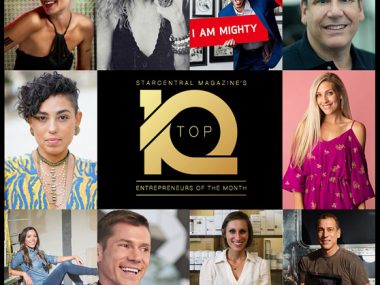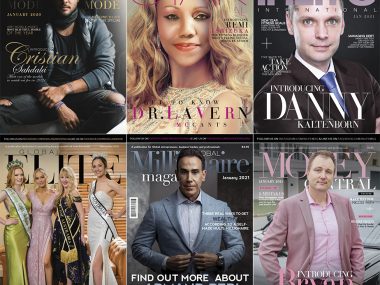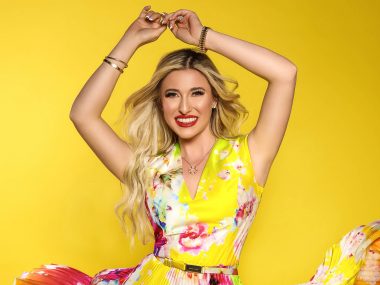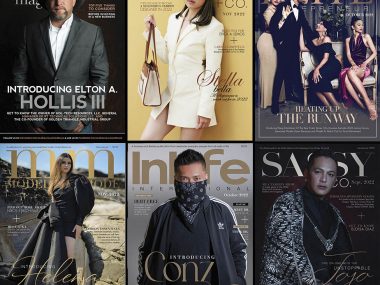Reality TV maven, former Allure Magazine editor, and Toronto’s own Real Housewife, Kara Alloway, emerges as the leading authority on all things REAL HOUSEWIVES worldwide. Her much-anticipated debut novel, “Most Hated,” published by RE: Books, offers a behind-the-scenes view into the enigmatic world of reality television and is now available in stores! Bringing her unique perspective to the narrative, Alloway unravels the intricate tales that unfold when six women dive into the realm of reality TV, seeking life-altering transformations. Within the intense backdrop of Talk of the Town, viewers are introduced to a world of make-ups, break-ups, and calculated manipulation, all orchestrated for captivating entertainment.
Commencing her career in journalism, Alloway’s trajectory was set in motion when Allure Magazine founder Linda Wells brought her aboard. Initially serving as the assistant West Coast Editor, she rose to the helm, steering Ingenue Magazine as its Editor-in-Chief. Under her visionary leadership, the publication witnessed record growth in circulation, setting benchmarks in Canadian publication history.
Apart from her stellar editorial stint, Alloway’s persona seamlessly transitions into the airwaves, hosting a spectrum of daily fashion and beauty radio shows. Her captivating interviews have welcomed industry luminaries like Stella McCartney, Laura Mercier, Phoebe Philo, Zac Posen, Diane Von Furstenberg, Bob Mackie, and Oscar de la Renta. Currently, Alloway dons the hat of an executive producer, steering the development of three distinct reality shows.
Beyond the glitz of the entertainment world, Alloway balances her bustling reality TV career with her cherished role as a devoted mother to her three sons in Toronto. This dedication extends further as she actively contributes her time and support to several charitable organizations, including Dress for Success, Children’s Aid Society of Toronto, Toronto Hospital for Sick Children, Opportunity International, Water Ambassadors Canada, and numerous others. Her commitment to making a positive impact on society echoes as strongly as her prowess in the reality TV universe.
StarCentral Magazine recently caught up with Kara to discuss her journey in the industry and here’s what went down:
As someone with a background in journalism and has worked with Allure Magazine and Ingenue Magazine, how did your experiences in the magazine industry influence your perspective and approach to reality TV production?
Journalism, production, and writing – they are all a form of storytelling. Whether you are reporting on the newest key ingredient in an eye cream, considering why teenage girls argue with their moms, or staging a tête-a-tête between star event planners – there are characters and an arc. At ALLURE the characters were dermatologists, makeup artists, hair experts, trichologists, and fashion insiders, at INGENUE it was all about the teens and their teendom, and in reality television it’s the participants and their journey from A to B. But it’s interesting how I gravitated to those arenas where there were stories that I understood merited dissemination.
Your debut novel, “Most Hated,” offers an inside look at the world of reality TV. Can you share some of the inspirations and personal experiences that influenced the storyline and characters in the book?
The emotions, especially the anxiety I experienced while participating in the show informed the characterization in the narrative of my novel. I also wanted to offer the reader a peek behind the curtain and cause them to rethink what they may have felt certain about in terms of how reality television production works. Without spoiling the plot – I can share that the iPad scene with Sabrina and Budgie was real and happened to me. Beyond that, I put a bit of myself in each character – both the villains and the protagonists. I also drew from loads of research. For example, Dahlia’s characterization was a result of conversations with the wives of professional sports stars. Lexi took shape after interviewing a few influencers. Zoe was easy because she’s a hybrid of many reality TV producers I’ve met. Sabrina landed on the pages after a deep dive into wives of narcissists and investigating wives of men who are involved in sexual harassment accusations. There was a great deal of investigative journalism that went into these women.
Being a former reality TV villain yourself, how did you navigate the challenges of being in the spotlight and dealing with public perception? How has this experience shaped your understanding of the reality TV world?
That was a learned skill, for sure. I remember reading stories that cast members from scripted shows like Coronation Street would often be approached by fans who believed they knew them via their “characters” from the drama. Reality television, while unscripted, is similar. Viewers would come up to me when I was having lunch out with my kids or shopping in the grocery store and want to jump into discussing my motivations within the narrative of the show. It’s unnerving, and at the same time, you want to explain that what they are seeing is a small slice of a story editor’s take on the action. But really you learn to smile and wave – like the Penguins of Madagascar. I am now able to watch from an entirely different perspective than the average viewer because of my experience behind and in front of the cameras. The content is meant to entertain and, like genuine art – elicit an emotional response.
As a reality TV show producer, what do you believe are the key elements that make for compelling and engaging reality television? How do you strike a balance between entertainment and authenticity?
You want to get that lightning in a jar/chasing chickens vibe whilst also tapping into a dreamer mode. When I say that, I mean you want the energy and action that draws the viewer in, you want the content to be relatable, and there also needs to be the aspirational aspect. My favorite example of capturing this is Keeping Up with the Kardashians: the content is relatable because everyone fights with their sibling, aspirational because of both the close-knit family and the opulent lifestyle, and there’s chasing chickens because – well, it’s the freneticism of the Kardashians. Another great example of this is Wicked Tuna – relatable because everyone has co-workers and competition within their field, aspirational because for some (my husband and boys!), making your living on the ocean seems idyllic, and crazy unpredictability because there’s a great deal at stake for these individuals and a fish on the line is a high energy occurrence.
Your expertise in reality TV has made you a go-to expert in the industry. What do you believe sets reality TV apart from other forms of entertainment, and why do you think it has such a dedicated and passionate fan base?
I believe reality TV offers an escape from our own receipts and electrocardiograms. What I mean by that is that the ability to observe humanity in action has a sedative effect that can be just what is needed when your own life becomes overwhelming. Humans love relativism, evaluating your position in terms of another’s, and reality TV, specifically docusoaps, delivers a glimpse into some very personal aspects of other people’s business. Someone recently shared the idea with me that a judgment is a confession, and I found that concept fascinating in terms of how we digest and metabolise reality television. Maybe these shows permit us to scratch an itch, to sit back and judge. When we see an over-the-top wedding like the one on Real Housewives of New Jersey last season, we might comment on how ridiculous and silly it appears. But consider that perhaps we are so quick to judge tiaraed sky-high hair and palace-worthy floral décor because, if we’re honest with ourselves, we wish for an overdone wedding just like that. Is there anything more satisfying than rehashing last night’s episode of Housewives with a few friends over drinks? Certainly, but that sort of dialogue and social interaction provides loads of laughs and noteworthy insights into how we evaluate others’ behaviour.
Your work as a journalist and editor has allowed you to interact with numerous industry icons. How has your ability to connect with prominent figures in the fashion and beauty world influenced your approach to reality TV production and storytelling?
I remember reading a quote from Donald Miller: “The most difficult lie I have ever contended with is this: life is a story about me.” Everyone has a story, a backstory, and a motivation. Can you see the difference there? We all have a purpose and a part to play in life, but we are all supporting characters to the bigger narrative. The most interesting and successful icons I’ve interviewed realize this. Sometimes, it’s identified as humility, but there’s more at work there.
“Most Hated” explores the dynamics and drama that unfold when six women join a reality TV show to change their lives. Can you discuss the underlying themes and messages you wanted to convey through this novel?
The theme I wanted to present within the story was the concept of internalized female misogyny. I’ve experienced it on both the receiving and giving end, and it’s very prevalent today. There are theories that the sisterhood has absorbed so much misogyny from the patriarchy that we now use it against other women and betray how we were created to interact with each other. Women are inherently relational – the world loves to observe how we relate to one another: Kylie Jenner reuniting with Jordyn Woods is headline news, Kate vs Meghan has the pundits lined up to comment. Some call it indirect aggression, but it’s deeper than that. Dr Phyllis Chessler has written a phenomenal book that touches on this called WOMAN’S INHUMANITY TO WOMAN, and it helped inform my characterization as well as explain to me what had happened to me on my franchise of Housewives. I need to remember who suggested I read it and thank them! According to Dr Chessler’s research, this behavior begins at age eight in the playground when the tribe of the sisterhood must retain power, so those who don’t fall into step with the group’s way of acting or thinking suffer the consequences. The independent thinkers are victims of patriarchal norms, including being shunned by gossip, slander, and grudge-holding. And it’s the little girls who practice this – little boys resolve issues with a tussle, but little girls are told to be nice, and sometimes that results in grudges. Please hear me: I am not advocating for more physicality among little girls or women at all. However, we need to teach little girls how to express anger as opposed to plotting and planning revenge. Just as sports have rules of engagement, we need rules of engagement within women relating to women, beginning with learning how to ask other women for what we want from them. If the friendship is toxic, you must be brave enough to leave the group. We need to apologize for mistakes we’ve made, even if we didn’t intend to hurt or thought what we were doing was right. And we need to be team players and praise the next woman, not try to take her out.
My novel is fun and funny and delivers a whimsical peek behind the curtain into producing reality television, but there are layers. I come from a matriarchal family, am one of two girls in a family, went to a private girl’s school until university, and I’ve always been fascinated by women interacting with women.
I also touch on women reshaping their narrative, which I think we do repeatedly throughout our lives. It took me a long time to appreciate the concept that we pass through seasons, and just like in nature, every season has a beginning and an end, but (let’s use a football analogy here because, in my book, one character is a former athlete married to an American football player), the game continues once a season is complete. There are a multitude of factors that affect the outcome of any given season, and a bad season doesn’t mean it wasn’t a season of learning or growth or that the next season can’t result in a championship win. Okay, I’ll stop. I’m getting very heady here now.
With three reality shows currently in development as an executive producer, can you share any insights into these projects and what excites you most about their potential impact on viewers?
The three shows are unique in their dynamics and formats. I have one docusoap that is a behind-the-scenes look at the multimillion-dollar network of charity fundraising event planning. It’s Million Dollar Listing meets Vanderpump Rules meets Fyre. I’m a sucker for behind-the-scenes content. The next one is a food-centric show about a group of individuals who are trophy hunters of food. They are experts in the history and science of food and go to Amazing Race lengths to taste the best of it. Knowing the genesis of a food item and the chemistry involved in its preparation fascinates me and somehow helps me appreciate a meal that much more – even if it’s fried chicken, a Reuben sandwich, or a taco. The final show involves dating wherein younger teens and young adults advise older singles how to win at love from their POV. I think intergenerational material is always fun.
Reality TV often faces criticism for its portrayal of individuals and situations. How do you ensure responsible and ethical storytelling while also delivering engaging content for viewers?
As I mentioned earlier, I consider Reality TV art in the purest form. The audience is given material to create their own thoughts and emotions – as in a classic definition of the work of art. A brilliantly talented producer, like Alex Baskin, who does Vanderpump Rules and Real Housewives of Beverly Hills, merely augments that reality with music or a clever camera angle. I keep saying just hand over the Emmy to him without a vote because his work on Vanderpump this year has been genius! Shed Media, who do Real Housewives of Salt Lake City, are also exceptional at producing with a gentle touch and directing the viewer’s attention to what needs to be seen. The way they juxtaposed Season 1 dialogue with Season 3 action was exceptional. Ditto for Truly Original and their work on Real Housewives of Atlanta, Potomac, and more recently, Dubai – there’s a reason their franchises do so well. The fans are a testimony to the work.
There’s a world of difference between that sort of excellence in production and a hack producer that needs to use frankenbiting and cherry-picking to manipulate reality. I think my production company had to rely on those methods because of casting issues. Audiences are clever and can spot shoddy practices, so you really must step it up to get a run of seasons of a show.
What advice do you have for aspiring reality TV producers and individuals looking to enter the world of entertainment journalism or publishing?
I’m so glad you asked that question because the world of publishing has become the Wild West, and for the debut author, it can be a scary frontier. The best advice is don’t skip steps or rush the process. Find a good agent who believes in your work and let them query reputable publishers on your behalf. There exist nefarious individuals, who present themselves as publishers but who are the worst iteration of hybrid publishers, looking for naïve writers eager to have their work in print. They will entice the author to sign a contract, ask them to pay a very large fee to “cover a portion” of the publishing costs, and promise a rapid turnaround for the work as well as a greater share of the profits than from a traditional publisher. They do little more than hire a sales agency to upload the title to digital platforms and depend on the author’s community of contacts to drive numbers in presales. They have no knowledge of the numerous avenues to marketing, distribution, and promotion involved in successful publishing,
and most of the titles they take on (they give the premise of a vetting process) never go anywhere. They are parasites and do a huge disservice to writers and readers alike. (Can you tell I’m passionate about this?) Traditional publishing is a measured and meticulous formula for a reason. Like anything worthwhile, it takes time and an investment of energy.
There’s specific advice I could give with respect to reality TV production– attend the Real Screen Summit in North America or similar A-List conferences closer to home to both networks and learn from industry experts. Then maybe some more general suggestions like “work in production under a talented producer,” “learn from the bottom up,” “ask questions,” and “observe.” I would also say, “read lots: content of every sort – fiction, memoirs, well-written articles” because you never know where that idea for a show will present itself.
For my Dumbledore moment, I’d like to share this…do not give up on yourself. When I heard “you can’t do that” or “you need to let others handle this,” it only served as fuel for my drive. My novel is a great read, and I believed in that and hustled. Be careful who you entrust with your work and never assign the responsibility of your success to anyone but yourself.
Photo Credit: Bobby Quillard
















